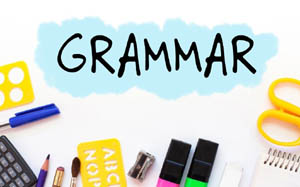English Bites!
 English Bites! are practical, bite-sized tips to help you improve your English for work. Published twice a week, the articles include useful advice covering different aspects of business English including grammar, vocabulary, writing, speaking as well as fun topics. It'll take just a few minutes to read each tip. You can subscribe to English Bites! from the Newsletters link above. After that, you'll receive notifications of all new tips by email.
English Bites! are practical, bite-sized tips to help you improve your English for work. Published twice a week, the articles include useful advice covering different aspects of business English including grammar, vocabulary, writing, speaking as well as fun topics. It'll take just a few minutes to read each tip. You can subscribe to English Bites! from the Newsletters link above. After that, you'll receive notifications of all new tips by email.
Verb + Preposition Combinations |
|
Many verbs are followed by a particular preposition. Since there are no rules concerning this, you need to memorise the combinations. Try to familiarise yourself with the most common verb/preposition combinations used in business writing. Here is a list of common verbs and the prepositions that normally follow them:
Example Sentences:
The following verbs can be followed by an object and a preposition:
Example Sentences:
|
|||
Talking About Your Work Using the Present Simple Tense
Avoid Referring to the Subject Heading
Writing Good Subject Headings
Common Errors with Phrasal Verbs: Unnecessary Prepositions
Explaining a Company's Organisation
Business Email: Replies to Requests (Useful Language)
Telephoning: Politely Declining Requests
English Around the World: South Korea
Questions to Dr English 3
American Business Etiquette Guidelines (Part 2)
American Business Etiquette Guidelines (Part 1)
Using Separable Phrasal Verbs
The A-Z of Redundant Phrases (Part 1)
Business English Learner Interview
Simplified English Jokes
Business Email: Use Subject Headings that Inform
Problem Words and Phrases in Business Writing
3 Rules for Using Articles (a, an, the)
Appreciate vs Would Appreciate
Subscribe to Workplace English Training E-Platform
Improve your business English through the world’s best and most comprehensive online platform

INCLUDES:
 Business English level test
Business English level test
 2000+ online lessons/interactive exercises
2000+ online lessons/interactive exercises
 My Learning Path module (members build their own courses from our content).
My Learning Path module (members build their own courses from our content).
 My Courses module (members can select from a number of course options).
My Courses module (members can select from a number of course options).
 Database of sample business documents
Database of sample business documents
 Library of 2600+ downloadable offline training resources
Library of 2600+ downloadable offline training resources
 Podcast lessons, tips, ebook training guides, fun stuff
Podcast lessons, tips, ebook training guides, fun stuff
 Student Helpline
Student Helpline
Key Benefits
- Focus only on the English you need for work.
- Learn at your own pace in your own time.
English Bites!
Latest Newsletters
- Business Word/Phrase of the Day - WORK OVERTIME
- Business English Tip of the Week - Using Prepositions of Place
- English Bites! - Verb + Preposition Combinations
- Workplace English Podcasts - BEP42: Clarifying and Confirming Instructions
- In-Depth Tips from Dr English - Tips for Networking when Business Socialising





 Verb + Preposition
Verb + Preposition